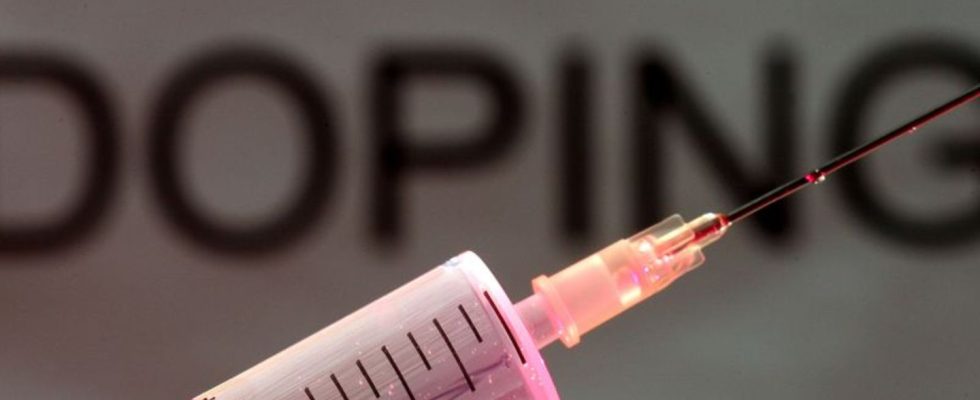The “Enhanced Games” project, in which doping should be allowed, is met with great rejection. Financiers lure people with a million-dollar bonus for world records and horrendous entry fees. Who is taking part?
The time in the promotional video of a virtual 100 meter run is stopped at 9.49 seconds. It would be a fabulous world record that the initiators of the planned games without doping limits dream of. For the sports world, the announcement of these “Enhanced Games” is a nightmare.
A number of billionaires have no qualms about staging world record hunts using doping substances that go beyond ethical boundaries. They lure athletes with a lot of money: a million US dollars as a bonus for a world record.
“The idea of the Enhanced Games deserves no comment. If you want to destroy any concept of fair play and fair competition in sport, this would be a good way to do it,” said the International Olympic Committee with unusual sharpness. “No parent would ever want their child to take part in such a harmful format where performance-enhancing drugs are a central part of the concept.”
The President of the Enhanced Games, on the other hand, believes that his event project will create the guild’s Olympic Games. “We are reinventing the sport from the ground up, unencumbered by anachronistic legacy systems,” said Aron Ping D’Souza. For him, the Olympics are “hypocritical, corrupt and dysfunctional.”
Playground for billionaires
The Australian entrepreneur is part of a group of billionaires that also includes Frankfurt-born Peter Thiel as a backer. Five core categories of sports were selected for their Enhanced Games: athletics, martial arts, strength and water sports, and gymnastics. More than that they will be held annually is still an open question.
An athlete has signaled his willingness to compete in the Enhanced Games. Three-time Australian swimming Olympic champion James Magnussen explains his motivation in a video on X, formerly Twitter: “Above all, it’s the money. Getting a million dollars for a world record.” He is also 32 years old and has reached his peak as an athlete. The Enhanced Games are “a real opportunity” to continue earning money after your career and continue to appear at a world-class event. “And it’s entertainment. Ronaldo also plays in Saudi Arabia,” said Magnussen.
For athletes in Germany, the idea of the Enhanced Games is based on a terrible vision of the Olympic Games in which athletes become “medical guinea pigs” through the approval of any performance-enhancing drugs. They would be “on top of that sent into a spiral of medical armament with unforeseeable consequences for their health,” criticized the advocacy group: “Instead of fair and clean competition, the Enhanced Games promote the unlimited greed for records and thereby deny the dangers associated with taking substances that are rightly banned accompanied.” German athletes would also be liable to prosecution under the anti-doping law.
The Enhanced Games makers’ criticism of the IOC for not paying prize money to the Olympic starters and thus driving them into poverty and debt could be “a temptation” to take part in the billionaire project given the precarious financial situation of many athletes, Athletes Germany warned . “The emergence of such alternative competitions with potentially high reach should be a further incentive for the IOC to finally reward athletes for their top performances,” said the association.
For the German Olympic Sports Confederation, the Enhanced Games would not be a threat to the global anti-doping fight. “No. On the contrary, it makes it clear how important prevention, control and sanctions are in world sport,” said DOSB President Thomas Weikert. “Because anyone who has even a shred of understanding for the values of sport, for fair play and clean competition, shakes their head at such strange fantasies.” The abandonment of rules and agreements would not make the sport “enhanced”, i.e. a better version of itself, but would have the opposite effect. “He would become poorer,” said Weikert. He couldn’t imagine German athletes taking part: “Certainly not those who represent Team D today.”
Criticism from DOSB, Sporthilfe and Nada
Deutsche Sporthilfe, which supports around 4,000 athletes, makes it unmistakably clear what the consequences of starting the project would be. “Of course, such an athlete would be immediately excluded from Sporthilfe funding, as it is a significant violation of the values of Sporthilfe and the agreements made with each athlete,” explained Sporthilfe head Thomas Berlemann. If a new segment for “doped athletes” were to establish itself, it would be “a fatal sign for children and young people if doping were perceived as a normal means of success.”
The National Anti-Doping Agency considers the idea of Enhanced Games to be “misleading and wrong.” The promise of safe and fair sport by the organizers through “experimental doping” to athletes is “a dangerous fallacy”. World records that are set using pharmaceutical products and without doping tests have no chance of being recognized: “Only records that are achieved in compliance with internationally recognized anti-doping regulations count.”
The World Anti-Doping Agency (Wada) and the International Testing Agency (Ita) also categorically reject the Enhanced Games. Ita fears that it could create “a doping culture” that goes “beyond professional sports.” WADA considers the Games project to be “a dangerous and irresponsible” concept.
The Enhanced Games organizers, however, see things completely differently. “Let’s be clear: drug testing is about fairness, not safety,” they respond.

